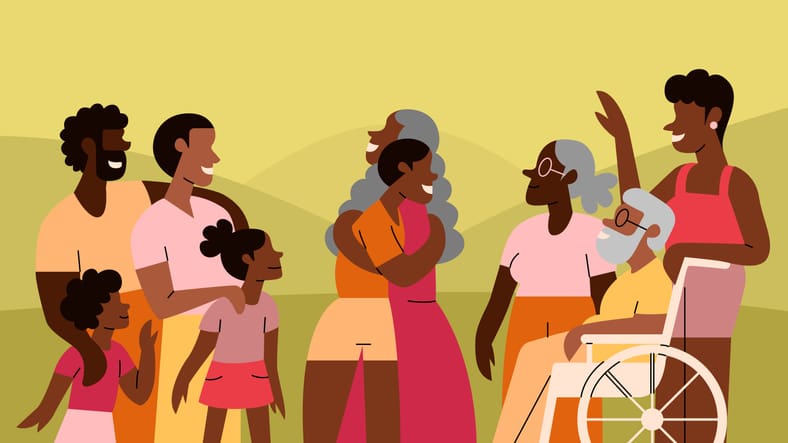Black Voices: News, Culture & Community from Across the Nation
Juneteenth, now a federally recognized holiday, commemorates June 19, 1865—the day enslaved African Americans in Galveston, Texas, finally learned they were free, more than two years after the Emancipation Proclamation. It’s a celebration of Black freedom, resilience, and cultural excellence. But it’s also a reminder: progress is not always linear.
In recent years, as some government policies and corporate agendas have shifted away from formal diversity, equity, and inclusion (DEI) programs, many people—especially in Black communities—are asking: How do we continue honoring our history while some of the systems meant to protect equity seem to be rolling back? It’s becoming an increasingly hard question to answer since President Donald Trump took office in January.
Within his first month back in office, President Donald Trump and his administration moved swiftly to dismantle key racial equity policies enacted under President Biden. One of their first actions was the rollback of Executive Order 13985, a directive designed to advance racial equity and support underserved communities by addressing systemic barriers in areas like employment, education, and housing.
Trump criticized the initiative as “public waste and shameful.” As a result, more than 20 companies stripped back vital DEI programs that would have allowed communities of color to thrive.
Just four months later, the administration took another significant step by issuing a new executive order aimed at reshaping how the federal government approaches civil rights protections. The order instructed federal agencies to “deprioritize” efforts that focus on group-based equity, emphasizing instead a return to what it called “equality of opportunity” over “equality of outcomes.”
It argued that individuals should be treated solely based on merit and personal effort, rejecting the consideration of race or gender in policy decisions. A central target of the order was the legal framework of “disparate impact,” which identifies discrimination in neutral policies that nonetheless produce unequal outcomes.
Critics warn that this shift is dangerous, as it ignores the real and ongoing impact of systemic discrimination—such as redlining, biased hiring practices, and educational disparities—that continues to disadvantage communities of color today and is overtly discriminatory.
Take action and educate yourself.
All of this is frightening to read, but as we approach Juneteenth, it’s important not to decenter the joy, freedom, and pride that came years after their powerful day in 1865. So, how do we celebrate Juneteenth this year? We celebrate louder, organize smarter, and connect deeper. Now more than ever, it’s time to come together, not just in resistance, but in joy, unity, and purposeful action. Our collective strength, celebration, and determination are what will push back against harmful policies and protect the progress we’ve fought for.
Juneteenth isn’t just a day off; it’s a powerful opportunity to honor Black history and reflect on the ongoing fight for justice and equality. Use the day to read books, watch documentaries, or attend local events that explore the legacy of slavery, the Civil Rights Movement, and modern-day civil rights challenges.
Nikole Hannah-Jones’s critically acclaimed piece, The 1619 Project, and Phillip Hoose’s Claudette Colvin: Twice Toward Justice are great places to start.
More importantly, make space for real conversations. Talk about what you’ve learned with friends, family, and coworkers. Education is a form of resistance and a foundation for meaningful change.
Support Black-owned businesses.
Economic empowerment has always been central to freedom. Use Juneteenth as a day to intentionally support Black entrepreneurs, artists, and creators. Buy from local vendors, dine at Black-owned restaurants, or promote their work on social media. Make it a year-round habit, not just a one-day gesture.
From parades and festivals to teach-ins and art shows, Juneteenth is celebrated in many forms. Even if large DEI programs are being scaled back, grassroots efforts continue to thrive. Show up, volunteer, or co-create an event in your own community. You can organize a neighborhood potluck with cuisine native to your culture, throw together a family-friendly history scavenger hunt, or take a museum trip.
The key is getting all your friends and loved ones together for a day of fun, inspiration, and community.
Uplift the legacy of DEI work.
Even as some institutions move away from formal DEI programs, their core purpose—equality, representation, and fairness—remains vital. On Juneteenth, recommit to those values. Whether you’re an employee, manager, student, or community member, look for ways to hold space for inclusion.
You can start conversations in your workplace or school about inclusive practices or form peer groups or informal diversity councils within your community. Your voice and impact matter.
Celebrating Juneteenth in the face of change isn’t about ignoring the challenges, it’s about responding with pride, power, and purpose. History has shown that progress often meets resistance. But Juneteenth reminds us that justice delayed is not justice denied— every generation must carry the torch forward.
Freedom is worth celebrating. Equity is worth defending, and Juneteenth is the perfect time to do both.
SEE MORE:
Read the full article on the original publication


